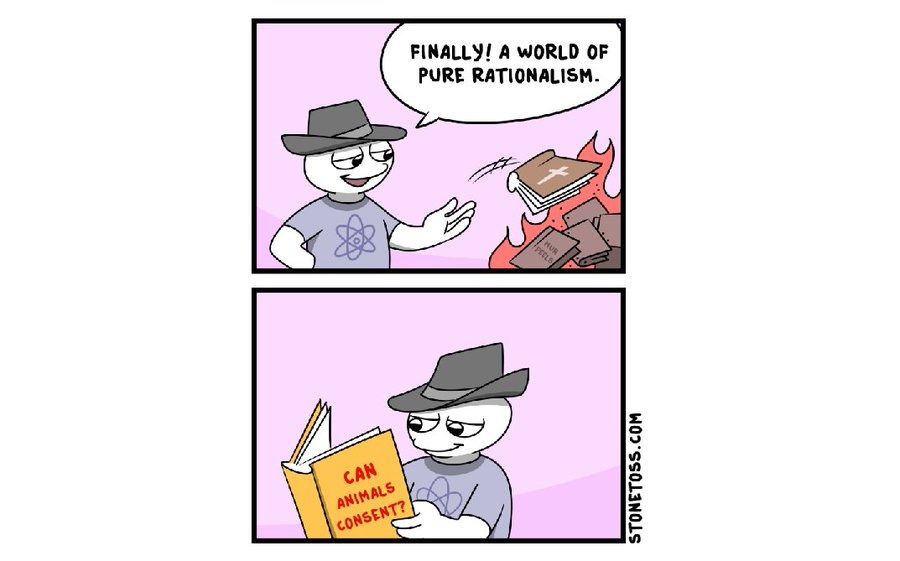critical animal studies (CAS)
What is Critical Animal Studies? This is the question Matsuoka and Sorenson propose to answer in What is Critical Animal Studies? In this essay, they write,
Critical Animal Studies (CAS) investigates human relationships with other animals. However, rather than regarding these relations only as matters for philosophical inquiry, CAS considers them as matters of
and takes an activist stance against oppression. CAS rejects anthropocentric views that characterize nonhuman animals as resources and normalize their consumption, challenging systemic and institutionalized exploitation. Opposing this structure of violence, CAS rejects not only the cruel treatment of nonhuman animals but their instrumentalist use. CAS recognizes nonhuman animals as individual and social beings with their own inherent value. Challenging anthropocentrism, CAS recognizes the agency, personhood and subjectivity of nonhuman animals. Transdisciplinary and transformational, CAS employs a range of methodologies to challenge dominant cultural and political practices.
Explicitly engaged and political, the goal of CAS is to change material conditions for nonhuman animals. Thus, CAS supports efforts to liberate animals from these oppressive conditions and encourages counter-hegemonic practices such as veganism. From a CAS perspective, veganism is not simply a diet but a matter of justice, a political gesture against oppression. We consider oppression has five aspects, following Iris M. Young’s (2012) understanding: exploitation, violence, marginalization, powerlessness and cultural imperialism.
CAS recognizes that various systems of power intersect and that the domination of nonhuman animals operates in the context of other systems of oppression. The oppression of nonhuman animals is justified on the basis of speciesism.
They go into specieism at some length. See our section on specieism to see what Matsuoka and Sorenson write on this matter as well as what others have to say on specieism. They later write,
the oppression of nonhuman animals is consistently entangled with the oppression of various human groups. Thus, speciesism affects not only nonhuman animals but also various groups of humans who are equated with them and, thereby, marginalized. Intersectional understanding of oppression is a critical aspect of CAS. Ecofeminists, like Carol Adams and Josephine Donavan, have made significant contributions to CAS by noting the intersectional oppression of sexism and speciesism not only in individual practices but in institutionalized social practices.
In the work we just looked at, authors Matsuoka and Sorenson do not cite particular sources to support specific points. They offer the following to support, in general, their essay.
References:
Matsuoka, A. and Sorenson, J. (Eds). (2018) Critical Animal Studies: Toward Trans-species Social Justice, London: Rowman & Littlefield International.
Nibert, D. (2002). Animal rights human rights. Lanham: Rowman and Littlefield.
Nocella, A. J. II, Sorenson, J., Socha, K. & Matsuoka, A. (Eds.). (2014). Defining Critical Animal Studies: An Intersectional Social Justice Approach. New York: Peter Lang Publishing.
Regan, T. (1983, 2004). The case for animal rights: Empty Cages. London: Rowman & Littlefield Publishers
Ryder, R. D. (2000). Speciesism, Animal Revolution: Changing attitudes towards speciesism. Oxford: Berg.
Singer, P. (1990). Animal liberation. New York: Ecco.
Sorenson, J. & Matsuoka, A. (Eds). (fall 2019) Dog’s Best Friend?: Rethinking Human-Canid Relations. Montreal and Kingston: McGill & Queen University Press.
Sorenson, J. & Matsuoka, A. (2018). Introduction. In Matsuoka, A. & Sorenson, J. (Eds). Critical Animal Studies: Toward Trans-Species Social Justice. (1-17). London: Rowman & Littlefield International.
Young, I.M., (1990, 2011). Justice and the politics of difference. Princeton: Princeton University Press.
There is also something called feminist animal studies (a name that some might argue is redundant). We hope to have a section on that in the not too distant future.

See the following resources and sources;
European Association for Critical Animal Studies
ICAS - Institute for Critical Animal Studies
North American Association for Critical Animal Studies
Critical Animal Studies - Thinking the Unthinkable by John Sorenson
Critical Animal Studies and Social Justice - Critical Theory, Dismantling Speciesism, and Total Liberation edited by Anthony J. Nocella II and Amber E. George
Critical Animal Studies - Towards Trans-species Social Justice edited by Atsuko Matsuoka & John Sorenson
Critical Animal Studies edited by Richard Twine & Claire Parkinson
Defining Critical Animal Studies - An Intersectional Social Justice Approach for Liberation by Anthony edited by J. Nocella II, John Sorenson, Kim Socha & Atsuko Matsuoka
Journal of Critical Animal Studies
Rise of Critical Animal Studies - From the Margins to the Centre edited by Nik Taylor & Richard Twine

Cover image from ICAS.
Culture War Encyclopedia - others claim & move on, we prove & archive forever.
∴ Liberty ∴ Strength ∴ Honor ∴ Justice ∴ Truth ∴ Love ∴ Laughter ∴
See the Culture War Encyclopedia on
∴ Veritas uniat divisos ∴



